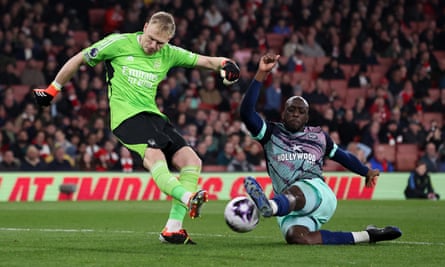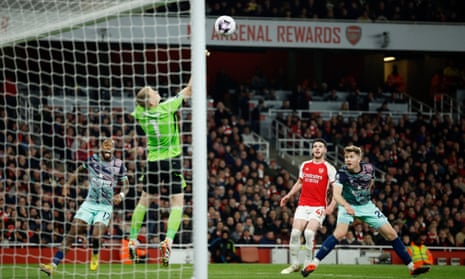Seeing Arsenal score their late winner was a little like hearing an old acquaintance has just received an official pardon. The inclination is to congratulate him, but what you’re really wondering is how on earth he got himself in the position of needing one.
In the end, because they won, this was a story of resilience and Aaron Ramsdale, at least, deserves credit for the way, having handed Brentford an equaliser, he made two outstanding second-half saves, one from Ivan Toney and one from Nathan Collins. There will be praise, too, for the way Arsenal more generally kept going and found the win that took them top of the table, but this was not a game that would assuage the suspicion that their volatility could undermine their title challenge. When things are good, Arsenal are very, very good, but when they are bad, they are perhaps not quite as good as they need to be.
The accusation that Arsenal bottled the title race last season never seemed entirely fair: Manchester City are better resourced. But at the same time, memories endure of those games at Liverpool and West Ham when Arsenal seemed to have the match under control only to buckle once they encountered resistance. Isolating causes is never straightforward, but it doesn’t seem unreasonable to draw a line to the defeats to West Ham and Fulham between Christmas and new year this season. In both what was striking was how Arsenal, having begun relatively well, lost their way and became unable to impose themselves on stubborn opponents.
But after seven straight wins in the league since their January trip to Dubai, with 31 goals scored and three conceded, confidence was high and Arsenal were riding a euphoric wave. In the mood they were in at kick-off, they are very difficult to resist: 1-0 up and cruising, the only half-thought of caution the fact their dominant first half had not put the game out of sight.
And then, the test. Whether David Raya is an upgrade on Ramsdale can be debated. Perhaps competition for places matters more than the sense of security former goalkeepers seem to consider essential. But what Raya’s arrival on loan from Brentford has done is heighten the focus on the position. Raya’s form may have eased that scrutiny to an extent but, unable to face his parent club, his absence flipped the spotlight back on to Ramsdale, who was making his first appearance since January’s FA Cup defeat by Liverpool.

So when he belted a clearance into Yoann Wissa to give Brentford an improbable equaliser – last week the DR Congo forward scored an overhead kick, as he put it, “for those who love football”; this week his goal was perhaps for those who love farce – it inevitably reopened the whole debate. Would he have made the mistake had he been playing regularly? Who knows? Choose your hypothetical as required for whatever argument you’re trying to mount. In truth, though, at least as significant as Ramsdale’s hesitation was Arsenal’s general loss of intensity after a delay for treatment to Kristoffer Ajer, as though they believed the half were already over.
A straightforward win was transformed into potential trauma. This could easily have been West Ham last season revisited. How many times have we seen this? Arsenal, desperately seeking a goal, becoming increasingly ragged as the Emirates crowd become increasingly furious. The Reiss Nelson Protocol vainly enacted as the memories of Bournemouth last season become fainter. The opposition scrapping and spoiling. Frantic appeals for penalties and cards. Shots clattering into defensive bodies and one pinging off an angle. Frustration slowly overwhelming hope. Except this time there was a twist: another cross from Ben White, who had set up the opener, and Kai Havertz’s winner.
How to assess a game like that? Praise Arsenal for getting the job done? Or criticise them for letting slip a position of such authority?
after newsletter promotion
But then that’s how it was last season. When Arsenal beat Aston Villa and Bournemouth with late goals it was portrayed as evidence of their character, almost of some sort of destiny – just as Liverpool’s emotionally exhausting wins have been this season – when in fact it was evidence of the fallibility that was later exposed. You can only go to the well so often; eventually the dramatic late goals run out.
Arsenal have not had to rely on them recently. This may be the sort of goal that reinforces the dream, the sense that it is meant to be, but equally the lack of composure after conceding, the way they allowed themselves to be rattled, must be a concern. A vital three points or a worrying portent of a tendency to panic under pressure? That may depend on whether they go on to win the league. How to judge this game? It’s probably too soon to tell.
